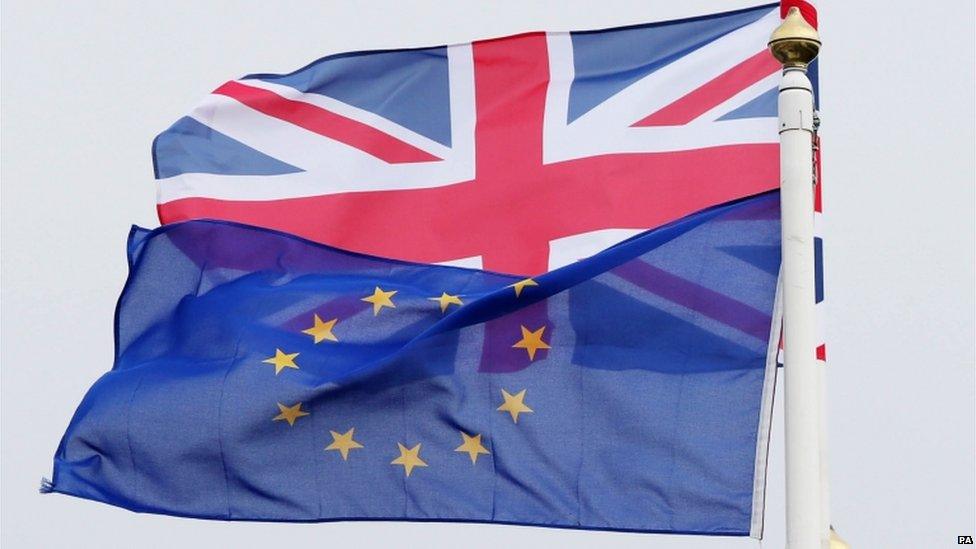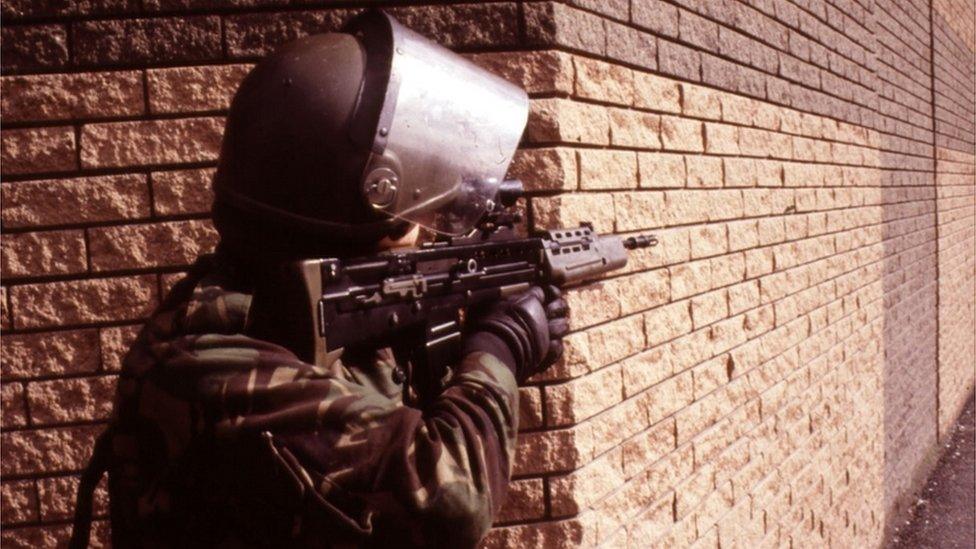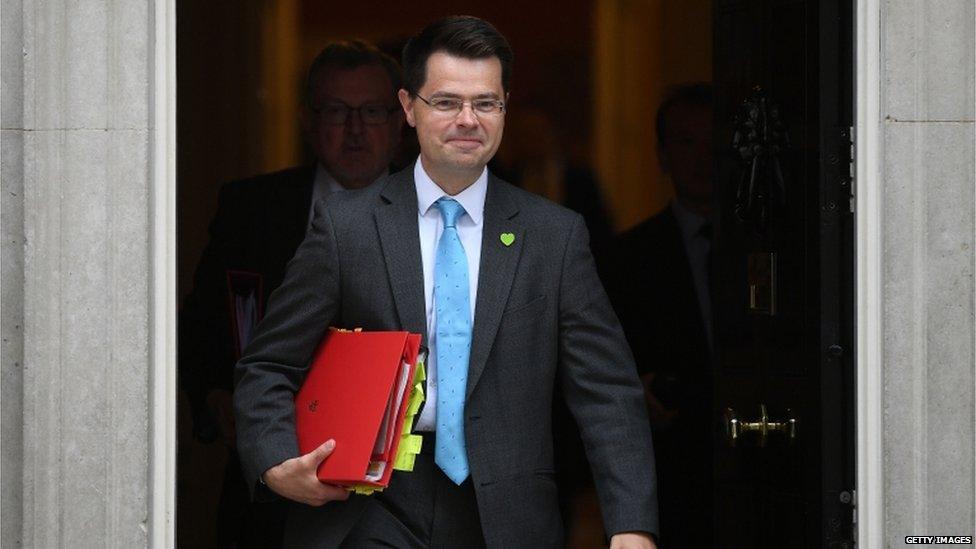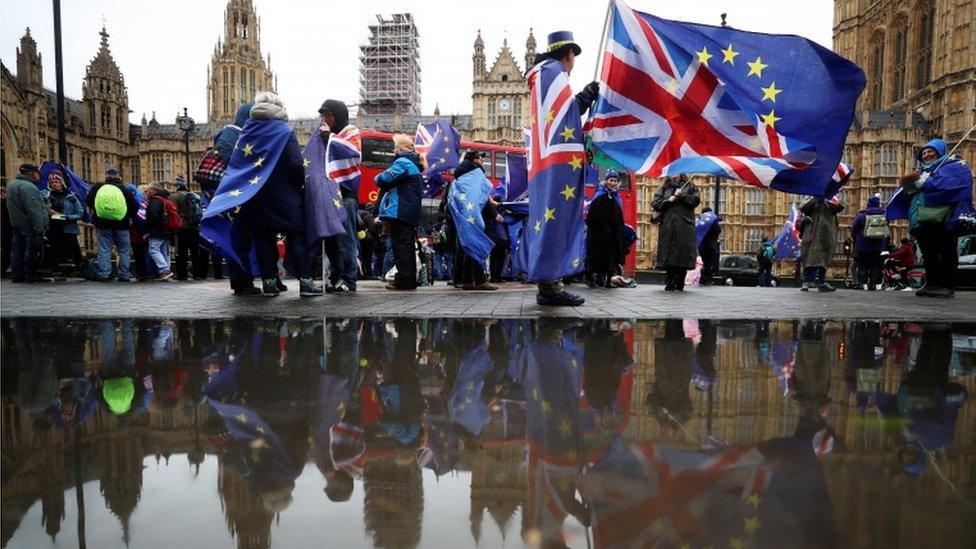Week ahead in Parliament
- Published
- comments

The outcome of the government's Chequers meeting on Brexit will shape the political and parliamentary week ahead.
If the discussions produce a white paper on future customs arrangements which Conservative MPs can unite around, then the febrile atmosphere of the last few weeks should evaporate.
But the "if" in that sentence is an enormous, gargantuan, unstable monosyllable, which requires any number of magical ingredients to crystallise into something solid.
The expected timeline for these events will see the publication of a white paper on Monday, or more probably Tuesday. There is not necessarily anything sinister about a minor delay, because the drafting of key sections will need to be agreed by the various cabinet factions, and the general palaver around publishing this kind of document may take a while.
The PM has lots of international commitments next week, but will presumably make a Commons statement, at some point. Backbench reaction will be watched closely. As deadly as criticism may be praise from the "wrong" source - and then there will be PMQs where David Lidington will be standing in, while Theresa May attends the Nato summit.
Then it all depends on how the white paper lands. If that magical consensus is achieved, then the looming possibility of a soft Brexiteer rebellion on the Trade Bill (expected back in the Commons the week after next, for report stage) fades away.
But if the white paper embodies a deal unacceptable to Brexiteers, whether over freedom of movement, regulatory alignment, the ability to strike new trade deals, or European Court of Justice jurisdiction, what then? Cabinet resignations? Leadership challenges? Re-enactments on the terrace of some of the gorier scenes in Game of Thrones?
One thought in my mind is that the first big Brexiteer beast to quit the government in protest would become the titular high priest of Brexit...the leader of a powerful faction, a pivotal force in the party, and one of the two names on the ballot paper which will be sent to Conservative Party members when they come to choose a successor to Theresa May.
In the end there can be only one on the ballot paper....and the first step to any of that would be a stage-managed resignation statement.
Meanwhile there's a separate bit of Tory backbench rebellion brewing, for Monday, led by the former Defence Secretary, Sir Michael Fallon.
He wants to amend the Northern Ireland Budget Bill, external (this is basically an administrative measure which allocates funds) because there is no devolved assembly to do the job.
Normally a bill of this kind would be waved through, with a bit of griping about the DUP, but Sir Michael wants to attach a requirement that none of the money is used to fund historic prosecutions of service personnel, for alleged offences which took place more than 20 years ago.

British soldiers patrolled the streets in Belfast
There are issues around the Stormont Agreement and human rights which make this move difficult for the government, but there is enormous support on the Conservative backbenches, where many MPs seethe at the sight of former IRA members immune to prosecution for their activities during the Troubles, while service personnel are subject to investigation and trial.
But the amendment seems unlikely to command official Labour support, even though it is supported by some Labour MPs.
The other theme to watch out for is the next move by the SNP after they forced a series of votes during the England-Colombia game.
As their Shadow Leader of the House Pete Wishart told me on Radio 4's Today in Parliament, Commons rules afford many opportunities for further guerrilla tactics to disrupt or delay business.
In all honesty, the SNP have a real grievance about the procedural carve-up which minimised debate on clauses of the EU Withdrawal Bill, dealing with the EU powers to be passed to the devolved governments. These were added in the Lords and were not debated in the Commons, beyond a 20 minute interlude on consideration of them as Lords Amendments, which was monopolised by a minister.
I'm not sure, though, that more retaliation will get them very far. When Mr Wishart's political hero, the Irish Nationalist, Charles Stewart Parnell, exploited procedure to bring the Commons to a halt in the 1880s, the result was restrictive new rules.
Here's my rundown of the parliamentary week ahead:
Monday 9 July
The Commons opens (2.30pm) with Defence questions - to be followed by any urgent questions or statements. This might or might not include the PM on the Brexit white paper, but an urgent question on the latest bout of train chaos looks likely.
Then comes that Northern Ireland Budget Bill, external. It is not a done deal that Sir Michael Fallon's amendment (see above) will be selected for debate - and the procedure is a bit peculiar, in that, for reasons that pass all understanding, amendments cannot be officially tabled until MPs have agreed the programme motion for the bill.
I'm told the clerks, the custodians of parliamentary rectitude, are queasy about setting a precedent that could allow all kinds of amendments to a finance bill, on policy issues, in the future.

James Brokenshire will be answering questions from MPs on the Housing select committee
My committee pick is new secretary of state James Brokenshire's debut before the Housing, Communities and Local Government Committee, in a "getting to know you session". But there's also a late entry in the form of the Public Accounts hearing (4pm) on Universal Credit, with witnesses from local government and the DWP. The Comptroller and Auditor-General Amyas Morse is normally present at these events, and could well be invited to update the committee, after his blistering letter to the Work and Pensions Secretary Esther McVey about Universal Credit prompted her to apologise to the Commons for misleading the House.
In Westminster Hall (4.30pm), MPs will debate a group of petitions about the rules for visitor visas for family members of British citizens and UK residents. This will cover petitions calling for automatic approval of visit visas for families of British Citizens (71,178 signatures); a super-visa category for parents of British citizens similar to Canada (13,655 signatures); a right to appeal the refusal of a family 'visit visa' (6,730 signatures).
The largest petition in the group argues that family members of UK Citizens "shouldn't have to meet the same criteria as other applicants for a visit visa" adding that the "only requirement should be that a British relative sponsors them".
In response the government states they have no plans to change the immigration rules for families of British citizens.
In the Lords (2.30 pm), the first business is the introduction of two more members of the new intake of peers: Baroness Meyer, the founder and chief executive of the charity Parents and Abducted Children Together (PACT), and Lord McNicol of West Kilbride, the artist formerly known as Iain McNicol, the General Secretary of the Labour Party from 2011 to 2018.
Then comes a debate on the detail of the Creditworthiness Assessment Bill, external - the crossbench peer Lord Bird's bill to require credit agencies to take rental payment history and council tax payment history into account, when assessing people's creditworthiness. He argues that they tend to discriminate against tenants.
There are ten SI approval motions: on the New Towns; four to be taken together on the Combined Authorities in Cambridgeshire and Peterborough, Liverpool City, West of England and West Midlands; on single source contracting in defence; companies - miscellaneous reporting; on renewables obligations; on contracts for difference. The final business of the day is a 90-minute debate on public services in rural areas.
Tuesday 10 July
The Commons opens (11.30am) with Justice Questions - with any statements or UQs following an hour later.
The day's Ten Minute Rule Bill from the Cornish Conservative, Scott Mann, which aims to give the Environment Agency new powers over sewer overflows to protect beaches.
Then MPs polish off the Non-Domestic Rating (Nursery Grounds) Bill, external - which clears up a legal anomaly around the business rates on nurseries, and approve new standing orders which will set up the European Statutory Instruments Committee - the sifting committee promised by the government to oversee the anticipated glut of secondary legislation needed to implement Brexit.

Then there's a Lib Dem Opposition Day debate - on a subject to be determined by the party membership. Ten years ago this might have meant it was on site value rating, but now, my Lib Dem contacts assure me, it is bound to be on Brexit, probably on the need for a further referendum.
In Westminster Hall, there are debates on air passenger duty across the UK (9.30am); progress on 2015 steel summit commitments (11am) and open access rail services (4pm) and protecting defined-benefit pension schemes (4.30pm).
But my pick is the 2.30pm debate on customs arrangements after the UK leaves the EU. This is led by Stephen Hammond, one of the Conservative soft Brexit faction (they prefer the term "Realist" to "Remainer"). This could turn into quite a handy forum for discussing whatever emerges from Chequers, so the debate could be anything from a pro-government rally to a dress rehearsal for civil war.
My committee pick is the appearance by the Home Secretary, Sajid Javid, before the Home Affairs Committee (10.30am), which could provide more details on the Novichok poisonings.
In the Lords (2.30 pm) another new peer appears, in the form of veteran Conservative whip, John Randall who becomes Lord Randall of Uxbridge.
The main debate is on the detail of the Courts and Tribunals (Judiciary & Functions of Staff) Bill, external, where the key issues include the temporary deployment of deputy high court judges and the delegation of some judicial functions to court staff.
Dinner break business is a short debate on the UK's ongoing capability to design and manufacture helicopters, led by the former Lib Dem Leader, Paddy Ashdown,
Wednesday 11 July
The Commons opens (11.30 am) with half an hour of Scotland Questions, followed at noon by Prime Minister's Questions - which will be conducted by the deputies, David Lidington and Tom Watson. Again, depending on events at Chequers, this could be anything from a quasi-Roman triumph to the Ides of March.
Then, Labour MP and former nurse Eleanor Smith has a Ten Minute Rule Bill which aims to end private finance initiatives in the NHS, and to exclude the NHS from international trade agreements.
Esther McVey: "In fact, the NAO did not say that."
The main debates are on Labour motions on Universal Credit and shipbuilding. The first of those is a late change of subject, because Labour originally scheduled a debate on Blue Light Emergency Services.
So it looks as if they intend to up the pressure on the Work and Pensions Secretary Esther McVey, after she was forced to apologise to MPs for misleading the House. A key figure to watch is the formidable chair of the Work and Pensions Committee, Frank Field. (I'm not sure if the change in subject will mean he has to reschedule his Westminster Hall debate, discussed below.)
Ms McVey, as it happens, is before the Work and Pensions Committee (9.30am), to talk about disability employment - but she may well be asked about Universal Credit by Mr Field and others, while she's there.
In Westminster Hall, there are debates on the nuclear sector deal (9.30am); employment support allowance for people with motor neurone disease (11am); sporting listed events (4pm); and increasing choice for rail passengers (4.30pm). Former Minister John Penrose will argue that recent disruption means the time is ripe for a new "open access" system to replace the current method of rail franchising.
But my pick is Frank Field's debate on Universal Credit and the use of food banks (2.30pm). As a long standing expert on welfare issues and chair of the Work and Pensions Committee, he will argue that the roll-out of the new super-benefit has seen an increase, rather than a decrease, in food bank use - suggesting that it is increasing rather than reducing hardship.
In the Lords, the main business is the second reading of the Crime (Overseas Production Orders) Bill, external - this would enable law enforcement agencies to apply to British courts for an "overseas production order" requiring service providers outside the UK to produce or grant access to electronic data needed to investigate serious crimes.
This addresses an increasingly important law-enforcement problem, that electronic information is often stored outside the UK, particularly in the United States, and existing mechanisms to gain access are rather ponderous and can take many months.
The day's final business is a 90-minute debate on the progress made in combating neglected tropical diseases.
Thursday 12 July
The Commons opens (9.30am) with 40 minutes of Environment, Food and Rural Affairs questions, followed by mini-question times for the MPs who speak for the Church Commissioners, the House of Commons Commission, the Public Accounts Commission and Speaker's Commission on the Electoral Commission. Then comes the weekly House business questions to the Leader of the House, Andrea Leadsom.
Next comes a select committee statement from the Foreign Affairs Committee Chair, Tom Tugendhat, on the committee's latest report on Global Britain and the Western Balkans, external.
The day's main debates will be on subjects chosen by the Backbench Business Committee; first on Forced Adoption - on a motion recognising the pain and suffering that the practice of forced adoption caused many women from the 1960s onwards; and calling on the government to apologise.
The second debate is on the lessons from the collapse of the public sector mega-contractor, Carillion. With what promises to be a fairly scorching report from the Public Administration and Constitutional Affairs Committee due out on Monday, there are several select committees delving into this debacle, so there could be quite a lot of interest.
In Westminster Hall (1.30pm), there's a debate on failures in the banking sector - led by the SNP's Stephen Kerr and members of the all-party parliamentary group on fair business banking and finance, who are concerned about the lack of adequate reform of the banking system, and warn that methodologies used in the past at HBOS Reading and RBS/GRG are still in use, leading to more cases of abuses in banking practices and the insolvency process.
In the Lords, the main debates are led by Conservative peers: firstly on the measures being taken to promote personal saving and the role they can play in building a strong economy; second, on the steps being taken to engage with small charities and faith-based organisations in delivering UK aid services.
The lunchtime mini-debate will be on reviewing the gender recognition process and other commitments set out in the government's LGBT plan.